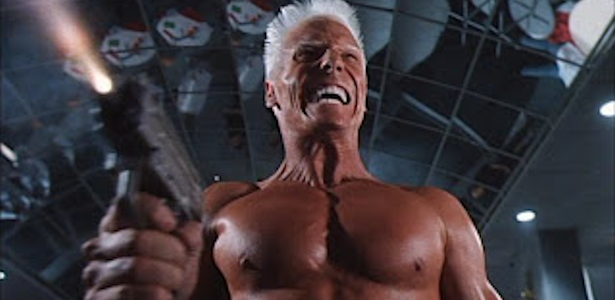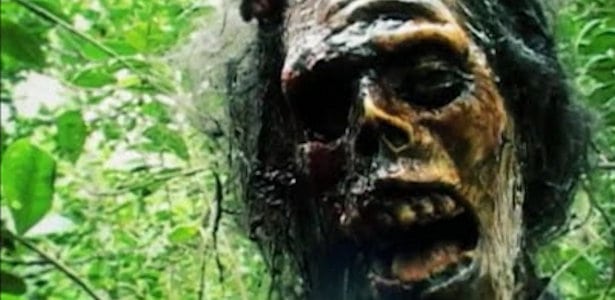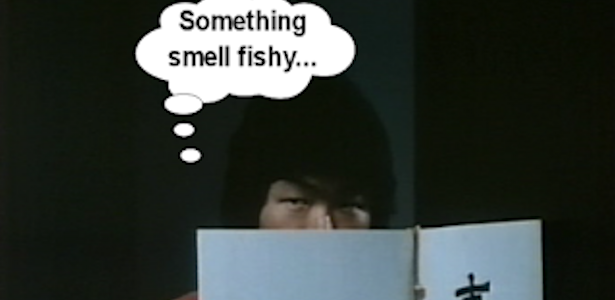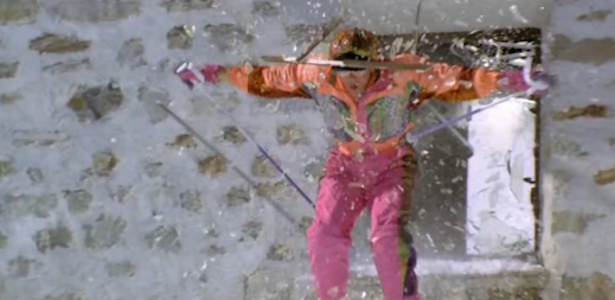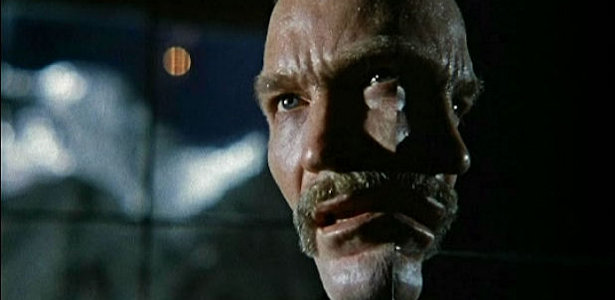To reiterate what I've said in the past, TV movies are an interesting breed. They tend to be completely budget starved and as a result they are often forced to be creative in the screenwriting department. Also, name actors who are past their prime tend to show up regularly and sometimes they are willing to take more risks in the story. Stuff that might not have much of a fighting chance in cinemas could do good business on TV, particularly due to the fact that home video was not only far too expensive for the average person and the major studios at the time were so against the idea that it became a massive legal battle with the intent of preventing the public from even owning a VCR, much less licensing their movies out to a video format. So if you wanted to watch a movie at home, you couldn't make it a Blockbuster night.
 If you roll all of that up into a big fat sushi roll of death, you have SAMURAI, an ABC TV movie that dares to challenge my assertion that you cannot make a bad movie in San Francisco.
If you roll all of that up into a big fat sushi roll of death, you have SAMURAI, an ABC TV movie that dares to challenge my assertion that you cannot make a bad movie in San Francisco.In the Marina near Fisherman's Wharf, some no-goodniks are attempting to... well, it's not clear what they are attempting to do, but it's definitely no good! Fortunately for the cougars of the Marina district, an unmasked avenger shows up out of nowhere clad in a black karate gi and a red headband! He's going to attack them with the power of the mystical martial arts, or make sashimi out of them with the katana at his side, right? Nope. He's going to grab a fire hose and, this is true, spray them all into a fishing net and then drop them in the ocean. Marina bros can sleep easy tonight, Samurai-Man is on the job! Actually he isn't called "Samurai-Man", he actually has no super name, though his identity is somehow secret in spite of the fact that he doesn't wear a mask.
During the daylight hours our chinpira hosing hero is none other than county prosecutor Lee Toshido Cantrell (Joe Penny). Cantrell was born in Japan and is the son of a Japanese-American businessman and a proper Japanese mother, yet for some reason looks rather like an Italian. Anybody know what the milk man looked like?
Since he grew up in Japan and is of Asian descent he of course knows karate, kenpo and bushido. As his father tells him, bushido is the code of "a warrior who pledges undying loyalty to the defense of those unable to defend themselves." Uhhh, first off, by most accounts, bushido's main attributes are loyalty, honor, frugality and marital arts, and second, that is a really odd motto for a county prosecutor. His old man is clearly the life of the party and he goes around in his kimono intoning pearls of ancient Japanese wisdom like "every land has only two laws... right and wrong." Yeah, thanks for the talk pops, gotta go fight crime now.
 After the cops stumble across a bunch of roughnecks who appear to be breaking into a warehouse, they find them sitting in a truck drinking whiskey saying that the reason that they are there is because it was a good place to party. Oh, and the explosives in the truck are from a construction job. Cantrell, being the sharpest wakizashi in the belt, catches a whiff of a rat and it isn't too long before he discovers that the evil Horizon corporation wants to gentrify an unnamed area of SF by running people out of their businesses and homes and creating a glittering new shopping center.
After the cops stumble across a bunch of roughnecks who appear to be breaking into a warehouse, they find them sitting in a truck drinking whiskey saying that the reason that they are there is because it was a good place to party. Oh, and the explosives in the truck are from a construction job. Cantrell, being the sharpest wakizashi in the belt, catches a whiff of a rat and it isn't too long before he discovers that the evil Horizon corporation wants to gentrify an unnamed area of SF by running people out of their businesses and homes and creating a glittering new shopping center.The president of Horizon is one Amory Bryson (Charles Cioffi), an ice-cold exec who prefers to work in the shadows. Literally, as Bryson works at night with massive office lit by a solitary desklamp. To aid him in his nefarious doings is his right hand man, Harold Tigner (Geoffrey Lewis), who feels that the best way to run the indigent crumbsuckers out of town is to hire a group of disenfranchised ex-military commandos to make the most clumsy attacks possible. Instead of simply throwing a molotov or two in an old Jewish man's warehouse, they actually break in a second time, run detcord all around the inside of the building, completely oblivious to the street-smart 9 year old kid who is witnessing it.
 Yes, this movie features two of '70s TVs most favorite characters, who are presumably the target demographic of cranky old Jewish men and precocious kids in hospital beds. Of course we also have the '70s staple of cops that refuse to believe a far-fetched story that is actually true, high-tech corporate security systems (oooh, a palm-reader!), and a low-speed chase between a Mercury and a Lincoln through the city streets. While the revs are kept pretty low, it is still pretty entertaining seeing those giant, multi-ton boats wallow around corners and crash over the hills. After taking a particularly hard slam into the crest of a hill you can clearly see all of the fluids hemorrhaging out of the car like pasta draining on spaghetti night.
Yes, this movie features two of '70s TVs most favorite characters, who are presumably the target demographic of cranky old Jewish men and precocious kids in hospital beds. Of course we also have the '70s staple of cops that refuse to believe a far-fetched story that is actually true, high-tech corporate security systems (oooh, a palm-reader!), and a low-speed chase between a Mercury and a Lincoln through the city streets. While the revs are kept pretty low, it is still pretty entertaining seeing those giant, multi-ton boats wallow around corners and crash over the hills. After taking a particularly hard slam into the crest of a hill you can clearly see all of the fluids hemorrhaging out of the car like pasta draining on spaghetti night.Somehow Cantrell manages to win a case against Horizon to get the plans for the shopping center temporarily blocked. We never see how he achieves this Miracle on McAllister Street, but he does. This makes Bryson so mad, that he decides it is time to break out his super-secret weapon that he has been developing in the basement of his office building, a machine that will send out sonic waves that will cause an earthquake within a seven or eight block radius. Sell it to the military, oh no, no, no. Bryson has bigger plans! He's going to use it to clear a path for a mall. Uhhhh, yeah. Dare to dream my friend, dare to dream.
Made one year before NBCs ratings-smashing miniseries adaptation of James Clavell's epic East-meets-West novel "Shogun", SAMURAI didn't have the wave of popularity that SHOGUN created for samurai pop-culture in the west. It might have been able to create its own wave but, as you may have noticed from my plot synopsis, for a movie about a lawyer moonlighting as a crime-stopping martial-arts hero, there is very little of either. As much as legal dramas were popular in the '70s, veteran TV writer Jerry Ludwig, chooses not to have any scenes of Cantrell rocking the courtroom aside from a brief scene in the beginning where he meets a friend from law school in what is clearly meant to be the set-up for a recurring character. As if that wasn't bad enough, Ludwig also keeps the vigilante/superhero action to a minimum with a few quick bursts of action sprinkled through the last half of the film.
The double edged sword here is that Ludwig tries to pack as much pop-culture themes into one script, which is cool, but it doesn't leave enough time for many of them to be interesting. We get some brief cliched scenes of martial arts training and meditation and the very end of a legal case, but mostly we get a lot of Cantrell talking to kids, flirting with the daughter of the warehouse owner, talking to the cops who don't want to hear his hair-brained theories and so on. Even worse veteran TV director Lee H. Katzin shoots these scenes utterly flat and Joe Penny is so utterly miscast that even James Garner would have been more convincing Japanese vigilante. Ok, maybe not, but it sure as hell would have been more fun. That is not to say that SAMURAI is without entertainment value. Even though Lewis is sadly wasted as a corporate yes-man, there are enough absurdities, such as Cioffi's stunning hairpiece and embarrassing attempts at white-fu (yes, I just said "Charles Cioffi" and "martial arts" in the same sentence) to keep the undiscriminating reasonably entertained.




